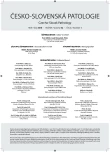Evolution of historical and social attitudes toward suicide
Authors:
Jozef Krajčovič
Authors‘ workplace:
Slovenská republika
; Ústav súdneho lekárstva a medicínskych expertíz, Jesseniova lekárska fakulta v Martine, Univerzita Komenského v Bratislave
Published in:
Soud Lék., 61, 2016, No. 1, p. 5-8
Category:
Review
Overview
In the article there is the repeatedly submitted experience detailing how death is a fundamental element of our lives, including by ones own hand - suicide, cases of which forensic pathologists are confronted with every day. The subject of suicide has been treated by the public as taboo, while in reality we are confronted by it every day, particularly in forensic medicine, where we are not only obliged, but also find it our duty to inquire as to the reasons, motivation and other factors that have led someone to take their own life voluntarily. The author was required to investigate the sociogenesis and psychogenesis of suicidal acts, the influence of successive social and cultural changes within society on suicides focusing on the psychiatric-biological, as well as the wider socio-cultural and philosophical connections. All major religions were and continue to be strongly against the act of suicide, which affects any who attempt suicide, but also their relatives. This state of affairs continued to develop until Durkheim, who initially established scientific research of suicides, primarily from a psychologicalsocial viewpoint. Suicide has been the final act of many world-renowned, as well as national, personalities, such as writers, artists, musicians and actors.
Keywords:
suicide – definition of suicide – history – social viewpoint on suicide
Sources
1. Látalová K, Kamarádová D, Praško J. Suicidalita u psychických poruch. Praha: Grada Publishing; 2015 : 9.
2. Špatenková N. a kol. Krizová intervence pro praxi. Praha: Grada Publishing; 2004 : 137-146.
3. Höschl C, Libiger J, Švestka J. Psychiatrie. 2 dopln. vyd. Zlín: Tigis; 2004 : 644-647.
4. Farmer RD. Assesing the Epidemiology of Suicide and Parasuicide. Br J Psychiatry 1988; 153 : 16-20.
5. Dytrych a spol. Problémy sebevraždy. Praktický lékař 1962; 42 : 92-99.
6. Milčinski D, Muačevič V. Socijalno-psihijatrijski pristup u suicidologiji. Socijalna psihijatrija 1987; 15 : 213-224.
7. Chmelař V. Problémy psychického vývoje a osobnosti. Praha: Academia; 1978 : 266-291.
8. Kafka J a kol. Psychiatria. Martin: Osveta; 1998 : 203-207.
9. Novotný V a kol. Špeciálna psychiatria. Bratislava: Univerzita Komenského; 2010 : 238-243.
10. Frýdecká L. Budeme říkat: vzal si život místo spáchal sebevraždu? Mladá Fronta Dnes, 2.2.2007.
11. Budinský L. Sebevraždy slavných. Praha: Euromedia Group-Knižný klub; 2000 : 212-213.
12. Kolibáš E. a kol. Všeobecná psychiatria. Bratislava: Univerzita Komenského; 1997 : 132-133.
13. Lester D. Genetics, Twin Studies, and Suicide. In: Maris R. Biology of Suicide. New York: The Guilford Press; 1986 : 192-20.
14. Koutek J, Kocourková J. Sebevražedné chování. 1. vyd. Praha: Portál s.r.o.; 2003 : 11-37.
15. Novotný J. Causa Kamikadze. Praha: Naše vojsko; 1991 : 41.
16. Hejna P, Janík M, Urbanová P. Agenesis of the superior cornua of the thyroid cartilage: a rare variant of medicolegal importance. Am J Forensic Med Pathol 2015; 36(1): 10-12.
17. Krajčovič J, Janík M, Kozman M. Tridsaťročný vývoj suicidality v regióne severného Slovenska: vybrané rizikové faktory. Folia Societatis Medicinae Legalis Slovacae 2012; 2 : 91-97.
Labels
Anatomical pathology Forensic medical examiner ToxicologyArticle was published in
Forensic Medicine

2016 Issue 1
Most read in this issue
- Evolution of historical and social attitudes toward suicide
- Fatal head injury caused by a crossbow arrow with unusually preserved posttraumatic volitional activity – case report
